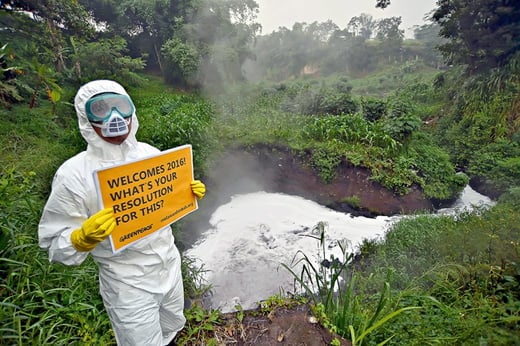Polluted drinking water, hazardous substances in the air – the cheap mass production of textiles and shoes is destroying the environment and harming people. The textile industry has responded by taking itself into detox.
"Detox our clothing!” Greenpeace told the big names in the fashion industry in 2011. The NGO tested the levels of pollution in Chinese rivers generated by the textile industry for its “Dirty Laundry” report and came to a shocking conclusion: Chemists proved the presence of azodyes, heavy metals and other contaminants with hazardous properties.
According to one press release issued by the environmental organization, “Organic chemicals such as nonylphenol and per-fluorinated substances were detected – they have a hormonal effect and can become concentrated in the food chain”. The issues that signalled the start of the big “Detox” campaign for Greenpeace are nothing new to the industry.
Way before “Detox”, the industry was already making efforts to avoid the use of hazardous substances for dying clothes and waterproofing jackets and shoes. But Adidas, Nike, H&M and premium brands like Victoria’s Secret are being lambasted by the media to great effect. Industry giants have given an undertaking to eliminate all dangerous chemicals from textile and shoe manufacturing by 2020. In the meantime, around 80 companies have committed to the “Detox” campaign.
Single solution
The supply chain for today’s fashion industry is a tangled network of several suppliers like chemical suppliers, global commodity producers, synthetic material developers, textile factories, dyers and finishers - and the manufacturers themselves. It is a Herculean task for them to unravel the entire production chain back to the raw material supplier.
TÜV Rheinland has been offering its new “Detox” solution program since July 2016 – an end-to-end solution. The TÜV Rheinland team assesses all the relevant stages of the supply network, employees are briefed in technical training sessions and audits to monitor any improvements made. And the focus is international, as these brands/retailers also operate in developing countries.
Manufacturers and suppliers receive assistance with excluding critical chemicals from the production process. “We offer our customers the appropriate package,” says Rakesh Vazirani, who manages the project from Hong Kong with the global teams. “From testing the waste water and raw materials to checking the finished product.” If waste water tests on the customer’s premises show bad results, for example, the next training session will focus on possible improvements. “We can operate at local level, adding our piece to the jigsaw,” explains Project Manager Vazirani.
In Vietnam, with its massive textile industry, TÜV Rheinland has already advised, trained and tested for 20 suppliers.
The need to look ahead
The outdoor industry is coming under increasing scrutiny from environmentalists. Greenpeace workers have found evidence of PFCs in lakes and snow in the Himalayas, the Andes and the Altai Mountains in Southern Siberia – per- and poly-fluorinated chemicals used to make trousers and jackets water- and dirt-resistant. These substances can damage human fertility and the immune system and lead to thyroid disease. And they last a very long time – they are used to impregnate textiles, after all.
Greenpeace has even found PFCs in the air in outdoor shops. “The problem doesn’t only concern the producer countries – but consumer countries too – that is now clear to everyone,” confirms Vazirani. Companies need to honor their Extended Producer Responsibility says the TÜV Rheinland expert. It isn’t only important to have “clean” manufacturing, but also avoid social labor issues and protect the environment.
The textile industry now needs to think ahead, too. Lots of items of clothing are really cheap – worn only a few times before being thrown away or shipped to countries in Africa and South America, some within the reuse market, but most into landfills. But they are not biodegradable. “We will have to face this problem with our children in future – Detox isn’t the final stage of the journey,” says Vazirani.
International network
The global business areas of Systems, Academy & Life Care and Products (Softlines) have been working closely together for the TÜV Rheinland “Detox” programme since October 2015. Around 40 employees in Bangladesh, Vietnam, China, Mexico, Turkey, Italy, India and Germany are currently involved.
So far one of a kind, the project will be expanded over time. And that’s not all. TÜV Rheinland is one of the major groups addressing the issue and involved in setting future standards. The first global waste water guideline is expected to be finalised end of 2016, the auditing standard early 2017.
TÜV Rheinland contributed to both. “So we are very well prepared,” says Vazirani. Greenpeace is keeping a very close eye on the industry. Through its online “Detox Catwalk”, the NGO reveals which brand has already made progress and who is still lagging behind in terms of being a “Greenwasher”. For details, stay tuned on www.tuv.com/detox




